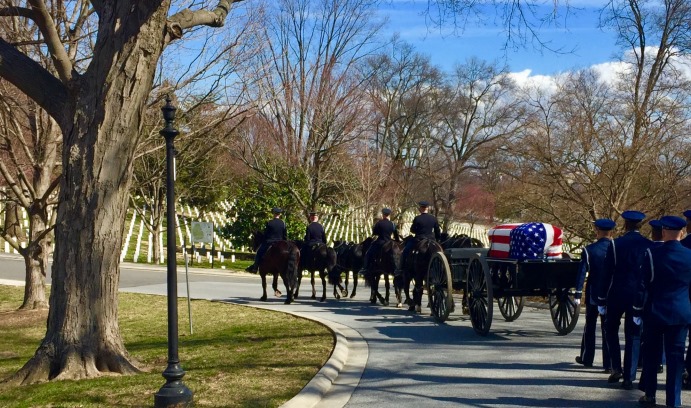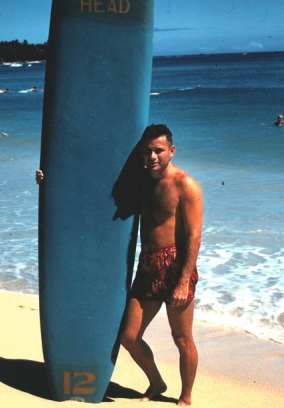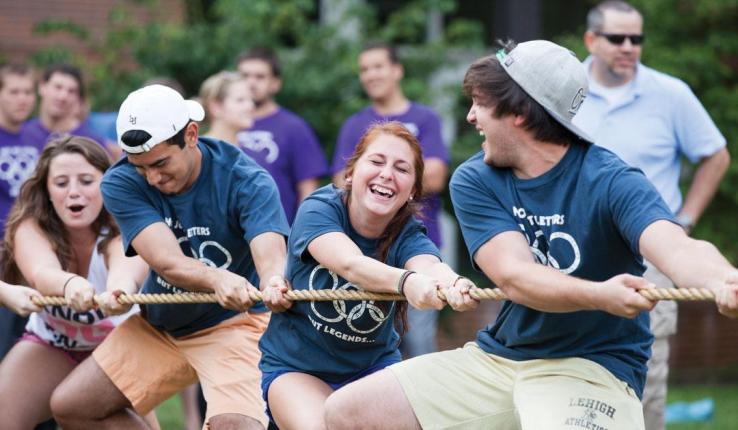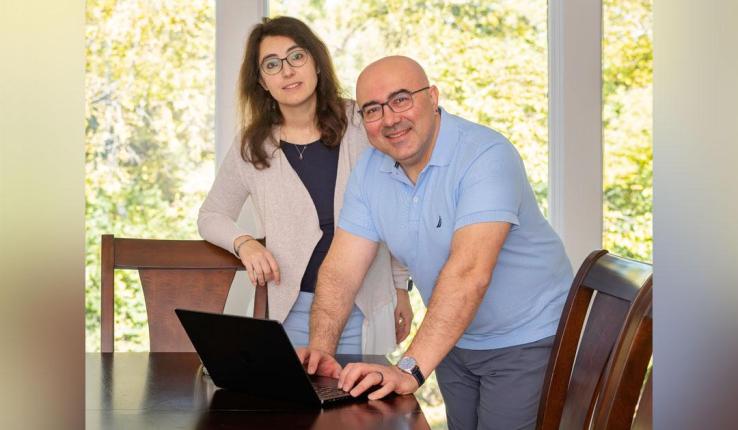A Hero Is Laid to Rest at Arlington National Cemetery

A military honor guard and band escort the remains of Thomas Schaefer ’53 to his final resting place at Arlington National Cemetery. Schaefer, a retired U.S. Air Force colonel, was the ranking military officer among the 52 Americans held hostage in the U.S. Embassy in Iran from 1979 to 1981. (Photo courtesy of Mark Schaefer)
Inside the Old Post Chapel at Arlington National Cemetery, U.S. Air Force Chaplain Major Kevin M. Hudson spoke of community and faith as family and friends paid their final respects to Thomas E. Schaefer ’53.
Community and faith, Hudson said, had helped Schaefer endure the darkest period of his life—the 444 days, including 150 in solitary confinement, that he spent as a hostage in the American embassy in Tehran, Iran, from 1979 to 1981.
“God forms us together into communities of hope,” Hudson said, “through families, through friends, through the workplace, and sometimes through people who are bound together by adversity, such as the group of hostages who were held in Iran, of which Tom Schaefer was a part.
“Tom’s faith in God sustained him through those 444 days…it enabled him to endure those difficult days in Iran and to continue to be a source of hope and courage for his fellow hostages.
“Each of us has been given a precious gift of life. Tom embraced that gift during times of trial and times of great joy. His was a life well-lived; his is a legacy of love, service and honor.”
Schaefer, a retired Air Force colonel, died May 31, 2016, in Scottsdale, Arizona. He was buried on Feb. 24 at Arlington National Cemetery in Virginia with full military honors: An honor guard carried Schaefer’s remains into the chapel. A bugler played taps; a military band led the procession to the gravesite. Pilots with the 77th Fighter Squadron at Shaw Air Force Base in South Carolina flew a missing man formation. And Hudson presented a folded American flag to Anita Schaefer, Tom’s wife of almost 63 years.
At his family’s request, Schaefer was buried near the Iran Rescue Mission Monument, which honors the three U.S. Marines and five members of the U.S. Air Force who were killed in April 1980 in a failed attempt to rescue the hostages.
Schaefer was nearing the end of his 30-year career in the Air Force when he received orders to serve as defense attaché at the U.S. Embassy in Iran.
In an interview with Lehigh’s Alumni Bulletin in 1989, he recalled his excitement over the assignment.
“The military said to me, ‘How would you like to go to Iran?’ I said, ‘Gee whiz, give me an airplane.’ After all, Iran was considered then to be the garden spot of the Middle East.”
On Nov. 4, 1979, several months after Schaefer had taken up his new post, protestors stormed the embassy and took all of its occupants captive. Schaefer and 51 other Americans were held hostage until Jan. 20, 1981.
As the highest-ranking military officer in the embassy, Schaefer told the Bulletin, he was responsible for the mental and physical welfare of his fellow prisoners.
“I tried to instill cheerfulness in the other people,” he said. “The main objective, which they teach you in terrorism training classes, is to get through 24 hours at a time. Make it the most productive 24-hour period of your life.”
Schaefer took the training to heart. He fashioned a daily fitness regimen, working up to 1,000 push-ups and three miles of lap-walking each day in his small cell. He dove into a set of German-language instruction books that he found in the embassy. He sang songs from Lehigh, from high school, from church. He relived family trips and played imaginary tennis games in his mind.
Schaefer also punched pin holes in his Bible to keep a coded diary.
“My days were full,” he said. “Four hours of exercise, two hours of German. I even programmed 30 to 40 minutes of relaxation time, thinking time, each day.”
Following his release, Schaefer became a public speaker, stressing the values of positive thinking, discipline and perseverance, and of forgiveness, to as many as 150 audiences a year. All in all, by his own estimate, he spoke to more than 300,000 people.
At a gathering after Schaefer’s memorial service, four former hostages—Barry Rosen, David Roeder, William Gallegos and Rodney “Rocky” Sickmann—said they had taken heart from his example and leadership.
“Tom Schaefer’s leadership, raw guts and determination to maintain not only his own integrity, but that of his country as well, were an inspiration to us all,” said Roeder.
Schaefer’s son Mark, who delivered the eulogy at the service, called his father “a man of faith, a man of honor, a man passionate about his family and his country.”
Tom Schaefer was also passionate about swimming, Mark Schaefer told the mourners.
“My dad swam competitively from a young age,” Schaefer said. “He was in the pool so often his friends in high school and college called him ‘Fish.’”
Tom Schaefer was also an accomplished surfer, and he shared his love for the water with Mark and his brother, David.
“To my dad, swimming competitively meant commitment, discipline and a desire to excel,” said Mark Schaefer. “But the other part of swimming—body surfing—meant bobbing in warm salt water under a brilliant sky, catching a good wave, feeling the surge and power of the sea as you hurtled toward shore, and afterwards, just lying in the sand and listening to the surf.
“On a good day Dave and I would be in the ocean with my dad for hours.
“Years later, when the hostage crisis was dragging on and on, I had to find a way stop thinking about where my dad was and how he was being treated. Falling asleep was a challenge, so I played back memories of riding the waves with him.”
In addition to his wife and his two sons, Schaefer is survived by six grandchildren and three great-grandchildren.
Story by Kurt Pfitzer
Posted on:





